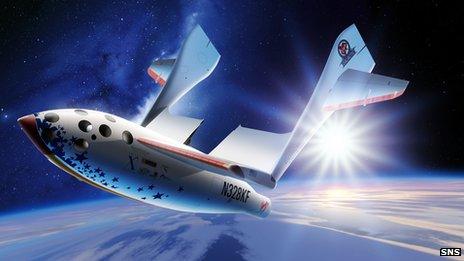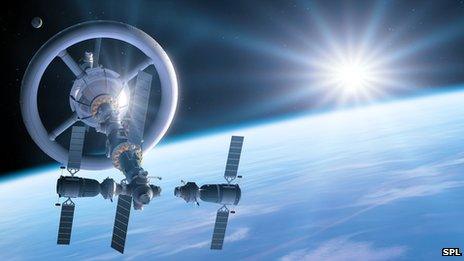What are the health risks of space travel?
- Published

The acceleration and deceleration of spaceflight could be a health issue for some space tourists
Astronauts are limited to spending six months on the International Space Station, around 200 miles above Earth, for a good reason.
The loss of bone and muscle mass they experience in space is so profound that they cannot stay any longer.
But what about the health impact of forthcoming suborbital flights for space tourists who are not fit, highly-trained individuals?
According to North American scientists writing in the British Medical Journal article, external, GPs should be prepared to answer patients' queries about their suitability for space travel in the near future.
Yet there will be few GPs experienced enough in space medicine to provide advice.
Past research tells us that spaceflight causes changes in the physiology of the human body, but how it might affect underlying medical conditions in an unfit, 50-year-old space tourist is not yet clearly known.
Dr David Green, senior lecturer in human and aerospace physiology at Kings College London, predicts that in the next two years or so significant numbers of people will be taking up places on suborbital flights in a specially-designed spacecraft.
This means they will dip out of Earth's atmosphere, experience weightlessness for around four minutes and then descend back to Earth's surface.
The speed of the acceleration and deceleration involved in that flight could be an issue for some, Dr Green says.
"It's highly likely you will feel sick or be sick and that's a real concern.
"Also, there will be an issue making sure everyone gets back in their seats after floating about.
"Going back to Earth, everything will feel heavier. You could knock yourself unconscious."
The most common problems during a spaceflight have been shown to be motion sickness, fatigue, dehydration, loss of appetite and back pain.
During the massive vertical acceleration and deceleration of spaceflight, it is hard for the heart to pump blood to the brain.
"If you have underlying cardiovascular disease that could be exposed," says Dr Green.
G-force
Dr Jon Scott, a senior scientist at QinetiQ and member of the UK Space Agency's space environment working group, has been involved in research to understand what increased gravitational forces do to people like fighter pilots.

A space hotel of the future?
"At the extremes, some people can tolerate as little as 3g and some as much as 6g. But there is no one simple, convenient thing you can measure to predict their tolerance. It would be great if a GP could test for it."
US researchers are looking at g-tolerance in sections of the population who could be the space tourists of the future.
The American Aerospace Medical Association Commercial Spaceflight Working Group published a document in 2009 saying that most individuals with "well controlled medical conditions" could withstand the acceleration forces involved in the launch and landing of a commercial spaceflight.
Their challenge, Scott says, is to gather information on a range of ages and health conditions - not just young, fit individuals - so that spaceflight companies can judge who can and who can't fly.
Key to life
"We don't want to have so many medical restrictions that no one can fly, but we want to make sure we truly understand the effects of these flights.
"There has to be a balance between medical safety and the industry flourishing - more information will help us find this balance."
The study of human physiology in space benefits more than just budding space tourists and astronauts though.
There are distinct similarities between the effects of lengthy space travel on humans and the effects of ageing on Earth.
"Astronauts' bones become weaker and their physical fitness decreases the longer they spend in space, much like an elderly person leading a sedentary lifestyle," says Dr Green.
"We can learn a lot about the fundamental mechanics of how to stay alive on Earth from going into space."
Increased access to space will bring challenges for medical experts and scientists alike as they attempt to minimise the side-effects of space travel for the general public while promoting the exhilaration of floating in microgravity.
- Published26 October 2011
- Published11 July 2012